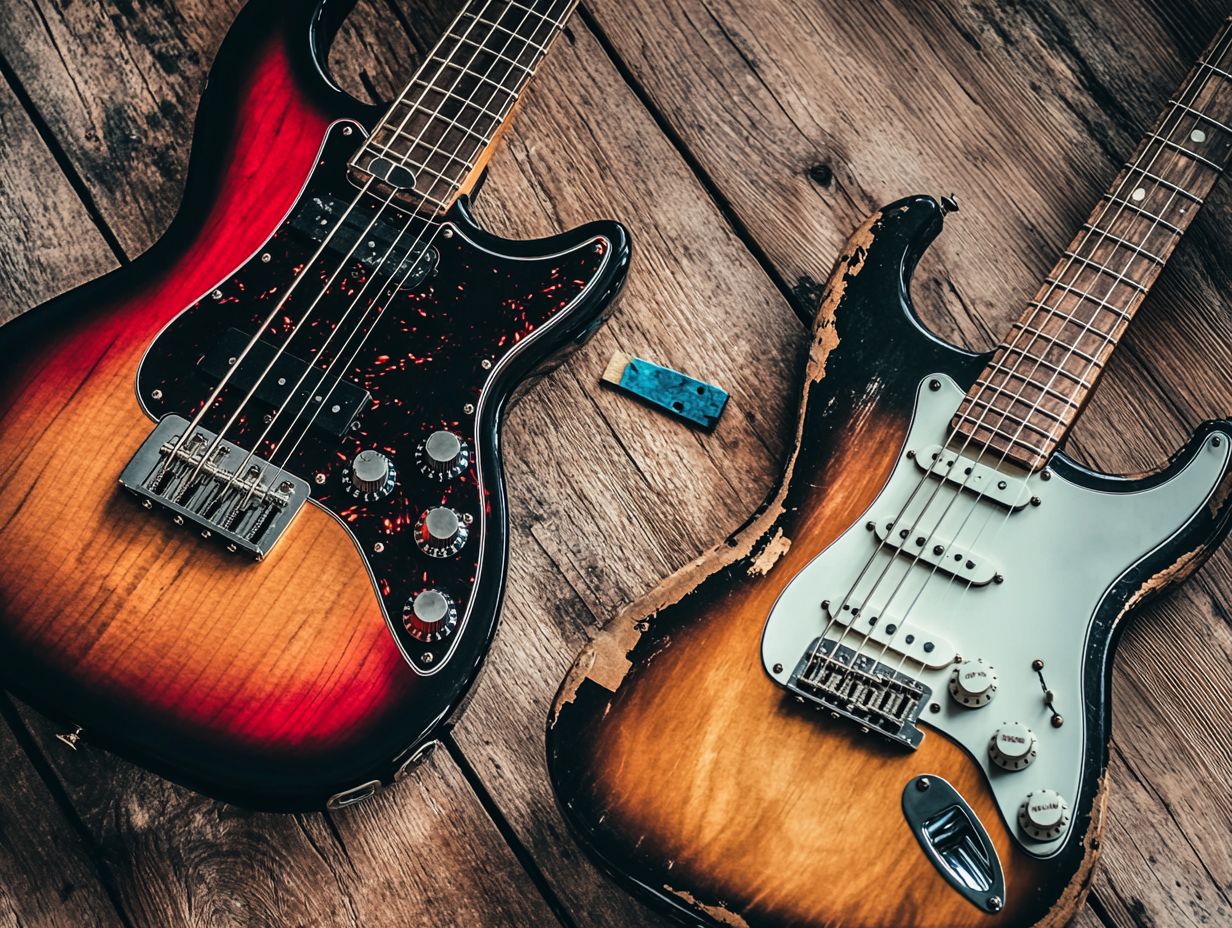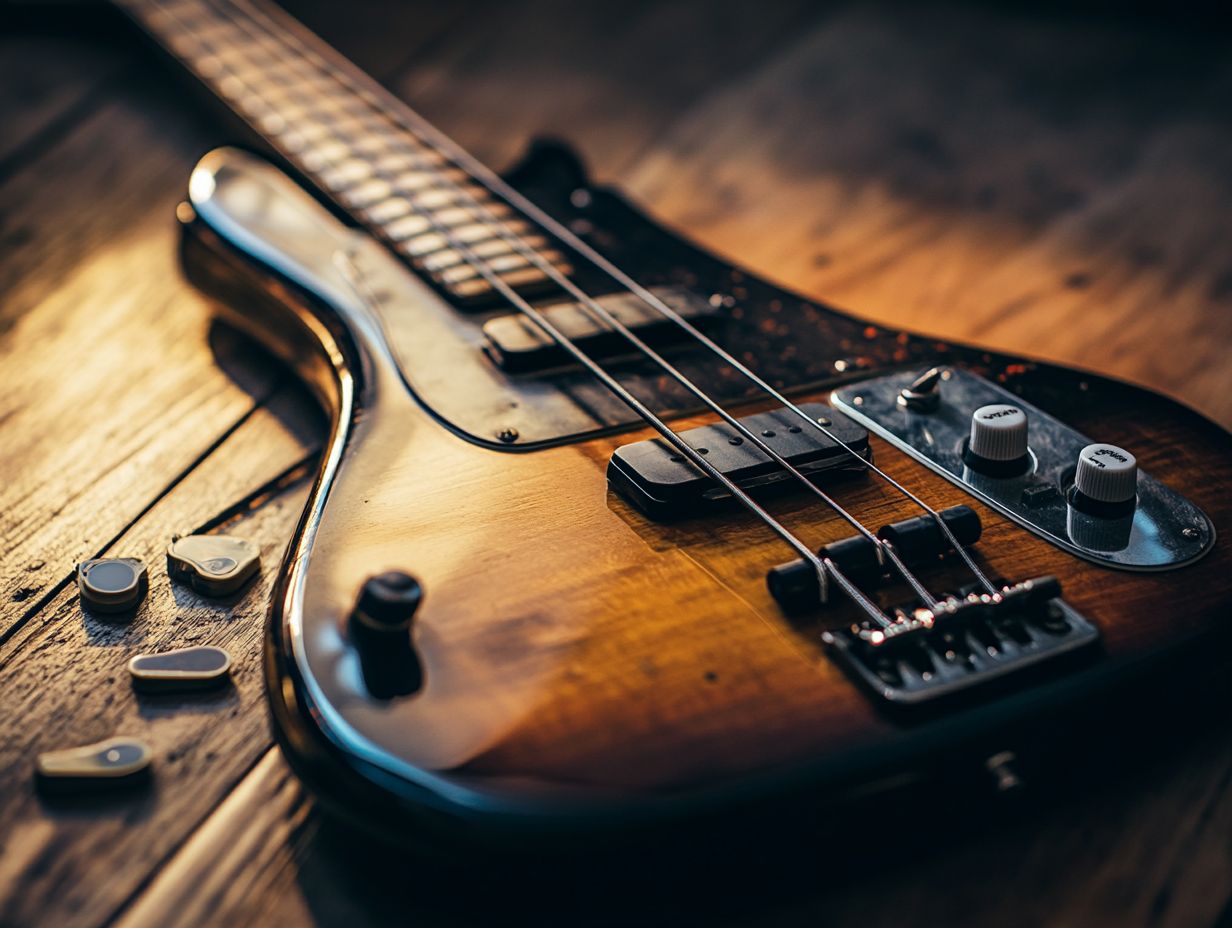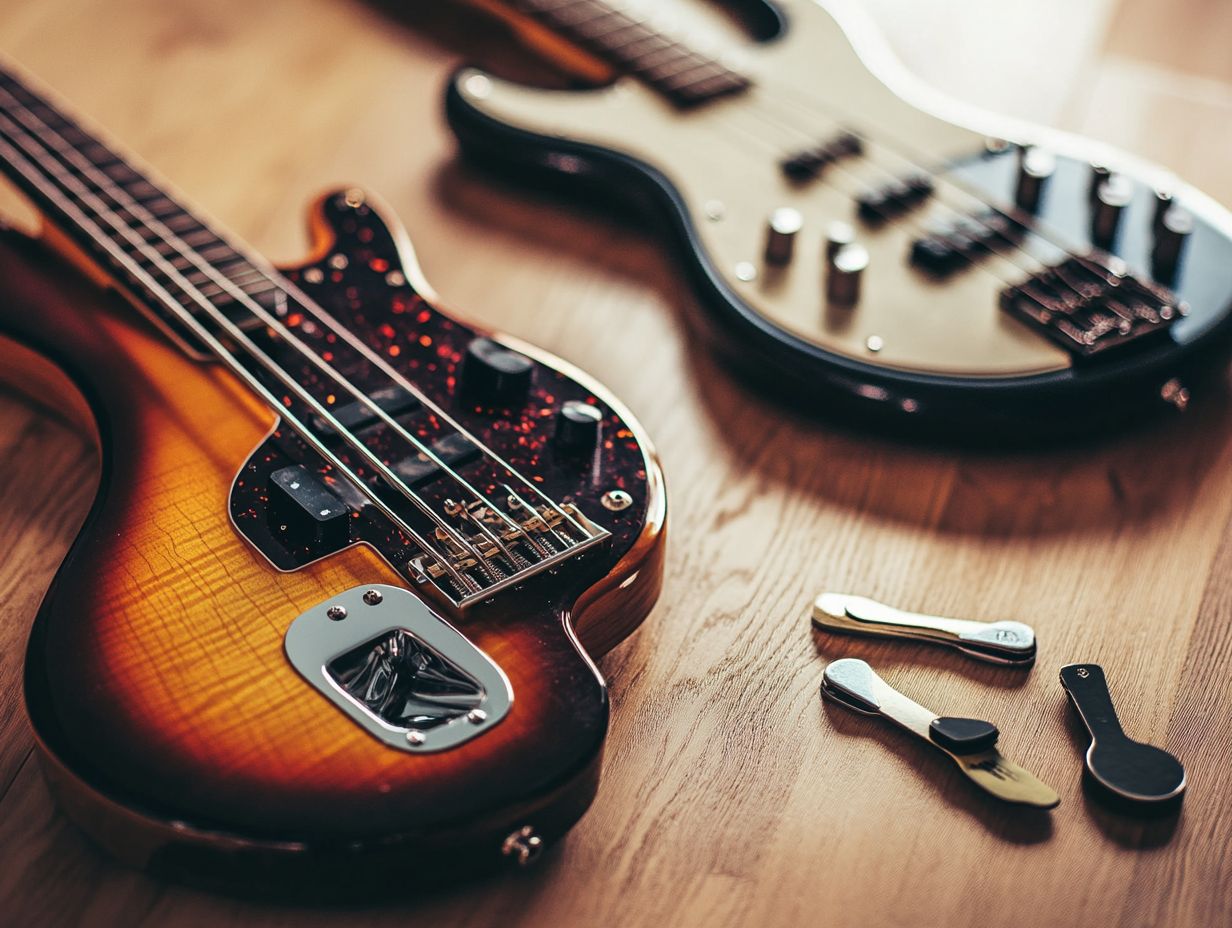Deciding whether to learn the bass or guitar first is a significant choice that can influence your musical journey. Each of these musical instruments offers its own unique benefits and challenges. Starting with the bass provides transferable skills, while diving into the guitar opens up a wide range of musical genres. It’s essential to consider personal goals, costs, and the time commitment required for each instrument. Whether you are beginning from scratch or seeking to expand your song repertoire, understanding these factors will help you make the right decision.
Overview of Bass vs Guitar

The fundamentals of both bass and guitar are essential for any musician embarking on a journey with either instrument. Each offers a distinct yet equally valid path in music education, featuring unique characteristics that suit different musical styles. Bass guitars provide the foundation for rhythm and harmony, while acoustic and electric guitars contribute melody and versatility.
For beginners, understanding how to learn bass or guitar can enhance engagement with music theory and practice techniques. Although each instrument presents its own learning curve, with dedication and the right resources, such as online tutorials, one can explore the rich array of musical genres.
For instance, in rock music, the guitar often takes the lead with powerful riffs and solos, as exemplified in the genre’s iconic song “Smoke on the Water” by Deep Purple. In contrast, bass guitars lock in the groove, as illustrated by the memorable bass lines in Queen’s “Another One Bites the Dust,” which drives the rhythm of the song and sets the stage for the melody.
While both guitar and bass can provide rhythmic support, the guitar typically offers melodic expression through techniques like fingerpicking or strumming, whereas the bass creates depth through plucking or slapping. Understanding these differences not only enhances a musician’s skill set but also deepens their appreciation for various music genres.
Benefits of Learning Bass Guitar First
Learning to play the bass guitar offers a variety of benefits, primarily because it serves as the backbone of a band. Bassists develop a strong understanding of rhythm and harmony, which provides a solid foundation for beginners to enhance their musicality, auditory skills, and foundational bass skills.
Additionally, bass lines are typically much easier to play than melodies or chords on other instruments, enabling beginners to quickly build their skills. Playing bass lines also aids in ear training and deepens one’s understanding of music theory. Since bass lines are often simpler than melodies or chords, learners can practice essential bass skills without feeling overwhelmed.
Furthermore, mastering the bass first fosters patience and discipline, equipping learners to explore a wide range of musical genres and develop their musicality.
Transferable Skills and Techniques

The skills and techniques acquired while learning the bass guitar are easily transferable to other instruments, particularly the guitar. As bass students master techniques such as finger positioning and rhythm, they also gain a solid understanding of music theory concepts that enhance their overall music education. This foundational knowledge makes it easier for them to learn the guitar, where grasping chord progressions and strumming patterns, two key guitar skills, becomes less challenging.
Both instruments’ practice routines should incorporate improvisation to foster creativity and adaptability. Learning bass lines helps students develop a strong sense of timing and groove, crucial elements in guitar playing and improvisation. Additionally, the ability to read sheet music or tablature for the bass broadens their understanding of harmony and melody, essential skills for any guitarist. Techniques learned from fingerstyle or slap bass can introduce different approaches to playing guitar as well.
A practice routine that emphasizes improvisation encourages flexibility, allowing musicians the freedom to explore and cultivate their unique sound. This focus on improvisation not only aids in the technical aspects of guitar playing but also contributes to the development of artistry.
Benefits of Learning Guitar First
Beginning to play the guitar allows novices to develop a diverse set of skills that enhance their creativity and performance abilities. Whether the student chooses an electric or acoustic guitar, they can explore a wide range of musical genres from the outset, enriching their guitar skills and musical creativity.
The guitar’s versatility enables students to experiment with songwriting and improvisation early in their learning journey, allowing them to personalize their music lessons and engage more deeply with music theory and practice strategies.
Additionally, playing with others and participating in jam sessions can significantly enrich the learning experience by fostering a strong connection with the music community.
Wider Range of Musical Styles

The guitar’s ability to encompass a wide range of musical styles makes it a popular choice as a first instrument for many learners. Both acoustic and electric guitars can cover genres from classical to folk, rock, and jazz, showcasing their versatility and appeal as a starting point for beginners. This versatility encourages improvisation and creativity, enabling learners to engage with a diverse array of musical genres and styles, enhancing their self-expression and enjoyment.
Finding an active music community can help reduce performance anxiety while providing valuable feedback and support throughout the learning process, thereby contributing to one’s musical goals and personal growth. As learners connect with this community, they uncover the intricacies of each genre, including unique chord progressions and rhythmic patterns, as well as picking technique and strumming patterns, that can influence their playing style.
This exploration of different genres fosters a sense of belonging, as learners can participate in jam sessions or local bands, which connect them with fellow guitarists and enhance their motivation and social growth. Sharing experiences and creative expressions in a supportive environment helps diminish performance anxiety, ultimately contributing to their social growth and development.
Factors to Consider in Choosing Your Starting Instrument
Choosing an instrument as the right starting point is one of the most crucial aspects of learning to play. Several key factors, such as personal interests and physicality, can help guide your decision.
Your personal preferences, including the sounds and styles of music you enjoy, as well as the types of instruments that appeal to you, will significantly influence your choice, aligning with your genre preference and musical creativity.
Additionally, the cost and availability of instruments, such as bass guitars and guitars, in your area, along with the time commitment required for each instrument, will also play a role in your decision-making process, considering aspects like instrument maintenance and gear selection.
Furthermore, understanding the learning curve associated with each instrument can help you set realistic goals for your progress, taking into account age considerations and cognitive development.
Personal Preference and Goals

Personal preference is a crucial factor when selecting the right instrument for each aspiring musician. Reflecting on one’s musical interests and goals can lead to choosing an instrument that fosters a more rewarding and stimulating learning journey, incorporating goal setting and dedication. The selection of an instrument goes beyond sound; it also involves the type of music that resonates with the individual, considering their learning style and enjoyment. Recognizing this connection can have a profound impact on their musical journey and overall musicality.
To better understand one’s unique musical interests, it can be beneficial to experiment with a variety of genres and styles, which opens up a wider array of possibilities to discover what truly speaks to them, enhancing their auditory and visual skills. Additionally, setting specific musical goals can further clarify preferences. For instance, if the individual wishes to perform with a band, they may prefer an instrument suitable for ensemble playing rather than one designed for solo performance, considering the cultural context and performance opportunities. Similarly, if their aim is to become a composer, an instrument that emphasizes improvisation might not be ideal, while playing for personal enjoyment at home may not necessitate an instrument that excels in technical performance, such as mastering scales and the fretboard.
Self-reflection also encourages adaptability. Each musical instrument presents its own challenges, and understanding that the learning process may not always be enjoyable can be a valuable lesson that enhances overall musicality and coordination. Ultimately, finding the right instrument is essential for growth and development as a musician. An instrument that feels like an extension of oneself can nurture motivation and passion, ultimately paving the way for a successful musical journey with a focus on self-expression and creativity.
Cost and Availability
The cost and availability of instruments can significantly influence your choice between bass and guitar. It is essential to understand the equipment investment required for both options, including accessories like string types and sound quality, and to explore local music stores as well as online resources to find quality learning tools. Making a well-informed choice based on cost and availability will set you on a positive path in your musical journey.
When selecting an instrument, it is crucial to consider both the short-term and long-term expenses, including repairs and replacements, as well as teacher recommendations. For instance, a beginner may find that more affordable options suffice at first, but as they advance, investing in higher-quality gear becomes important to enhance their experience and sound quality, considering instrument maintenance.
Balancing financial considerations with the potential for long-term growth can lead to more thoughtful decisions. Additionally, considering the available resources—such as music lessons or online tutorials—can significantly impact your learning speed and overall satisfaction in mastering the instrument.
Time Commitment and Learning Curve
The time commitment and learning curve for bass versus guitar are critical factors for long-term success as a musician, incorporating dedication and practice strategies. Both the bass and guitar require regular practice to develop foundational skills; however, the learning curves for the two instruments are significantly different, influenced by finger technique and dexterity.
A dedicated practice schedule is essential for navigating the challenges of skill development and ensuring consistent progress in learning guitar and bass skills. By setting realistic expectations regarding the time commitment required, you can enhance your enjoyment and fulfillment in playing musical instruments.
When approaching practice, it should be done with intention and incorporate practice techniques that suit your learning style. Devoting specific times during the week for practice can help cultivate discipline and enable better coordination and dexterity. Setting achievable short-term goals will also keep you motivated to improve your guitar skills and bass skills.
Incorporating a variety of techniques, such as scales, chord progressions, song learning, and rhythm exercises, can help combat monotony and promote diverse skill acquisition. Understanding the bass vs guitar dynamics is crucial, and choosing an instrument like an acoustic guitar or bass guitar should be based on your personal interests and genre preference. The learning curve for bass and guitar should strike a balance between challenge and accomplishment, making the process both motivating and rewarding in your music education journey.
Finally, practicing patience, embracing musical creativity, and being kind to yourself will be vital to your musical journey. Engaging in activities such as music theory studies, ear training, and online tutorials can enhance your auditory skills and overall musicality, ensuring a fulfilling experience.



